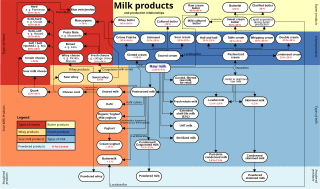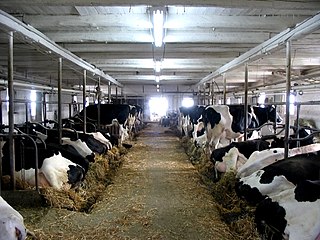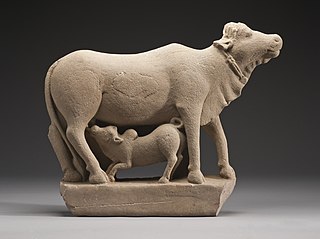
Dairy products or milk products, also known as lacticinia, are food products made from milk. The most common dairy animals are cow, water buffalo, nanny goat, and ewe. Dairy products include common grocery store food around the world such as yogurt, cheese, milk and butter. A facility that produces dairy products is a dairy. Dairy products are consumed worldwide to varying degrees. Some people avoid some or all dairy products because of lactose intolerance, veganism, or other health reasons or beliefs.

Danone S.A. is a French multinational food-products corporation based in Paris. It was founded in 1919 in Barcelona, Spain. It is listed on Euronext Paris, where it is a component of the CAC 40 stock market index. Some of the company's products are branded Dannon in the United States.

Bovine somatotropin or bovine somatotrophin, or bovine growth hormone (BGH), is a peptide hormone produced by cows' pituitary glands. Like other hormones, it is produced in small quantities and is used in regulating metabolic processes. Scientists created a bacterium that produces the hormone somatotropin which is produced by the cow's body after giving birth and increases milk production by around 10 percent.

Melamine is an organic compound with the formula C3H6N6. This white solid is a trimer of cyanamide, with a 1,3,5-triazine skeleton. Like cyanamide, it contains 66% nitrogen by mass, and its derivatives have fire-retardant properties due to its release of nitrogen gas when burned or charred. Melamine can be combined with formaldehyde and other agents to produce melamine resins. Such resins are characteristically durable thermosetting plastic used in high pressure decorative laminates such as Formica, melamine dinnerware including cooking utensils, plates, plastic products, laminate flooring, and dry erase boards. Melamine foam is used as insulation, soundproofing material and in polymeric cleaning products, such as Magic Eraser.

There are different systems of feeding cattle in animal husbandry. For pastured animals, grass is usually the forage that composes the majority of their diet. In turn, this grass-fed approach is known for producing meat with distinct flavor profiles. Cattle reared in feedlots are fed hay supplemented with grain, soy and other ingredients to increase the energy density of the feed. The debate is whether cattle should be raised on fodder primarily composed of grass or a concentrate. The issue is complicated by the political interests and confusion between labels such as "free range", "organic", or "natural". Cattle raised on a primarily foraged diet are termed grass-fed or pasture-raised; for example meat or milk may be called grass-fed beef or pasture-raised dairy. The term "pasture-raised" can lead to confusion with the term "free range", which does not describe exactly what the animals eat.
The Agricultural Marketing Service (AMS) is an agency of the United States Department of Agriculture; it maintains programs in five commodity areas: cotton and tobacco; dairy; fruit and vegetable; livestock and seed; and poultry. These programs provide testing, standardization, grading and market news services for those commodities, and oversee marketing agreements and orders, administer research and promotion programs, and purchase commodities for federal food programs. The AMS enforces certain federal laws such as the Perishable Agricultural Commodities Act and the Federal Seed Act. The AMS budget is $1.2 billion. It is headquartered in the Jamie L. Whitten Building in Washington, D.C.

Plant milk is a plant beverage with a color resembling that of milk. Plant milks are non-dairy beverages made from a water-based plant extract for flavoring and aroma. Plant milks are consumed as alternatives to dairy milk, and may provide a creamy mouthfeel.

The Central Science Laboratory (CSL) was an executive agency of the UK government branch, the Department for Environment, Food and Rural Affairs (DEFRA). It is now part of the Food and Environment Research Agency, which is in turn part of DEFRA.

AOAC International is a 501(c) non-profit scientific association with headquarters in Rockville, Maryland. It was founded in 1884 as the Association of Official Agricultural Chemists (AOAC) and became AOAC International in 1991. It publishes standardized, chemical analysis methods designed to increase confidence in the results of chemical and microbiological analyses. Government agencies and civil organizations often require that laboratories use official AOAC methods. AOAC is headquartered in Rockville, Maryland, and has approximately 3,000 members based in over 90 countries.

Food safety is used as a scientific method/discipline describing handling, preparation, and storage of food in ways that prevent foodborne illness. The occurrence of two or more cases of a similar illness resulting from the ingestion of a common food is known as a food-borne disease outbreak. This includes a number of routines that should be followed to avoid potential health hazards. In this way, food safety often overlaps with food defense to prevent harm to consumers. The tracks within this line of thought are safety between industry and the market and then between the market and the consumer. In considering industry-to-market practices, food safety considerations include the origins of food including the practices relating to food labeling, food hygiene, food additives and pesticide residues, as well as policies on biotechnology and food and guidelines for the management of governmental import and export inspection and certification systems for foods. In considering market-to-consumer practices, the usual thought is that food ought to be safe in the market and the concern is safe delivery and preparation of the food for the consumer. Food safety, nutrition and food security are closely related. Unhealthy food creates a cycle of disease and malnutrition that affects infants and adults as well.

Food safety in China is a widespread concern for the country's agricultural industry. China's principal crops are rice, corn, wheat, soybeans, and cotton in addition to apples and other fruits and vegetables. China's principal livestock products include pork, beef, dairy, and eggs. The Chinese government oversees agricultural production as well as the manufacture of food packaging, containers, chemical additives, drug production, and business regulation. In recent years, the Chinese government attempted to consolidate food safety regulation with the creation of the State Food and Drug Administration of China in 2003; officials have also been under increasing public and international pressure to solve food safety problems. Chinese Vice Premier Li Keqiang said, "Food is essential, and safety should be a top priority. Food safety is closely related to people's lives and health and economic development and social harmony," at a State Council meeting in Beijing.

Organic food, ecological food, or biological food are foods and drinks produced by methods complying with the standards of organic farming. Standards vary worldwide, but organic farming features practices that cycle resources, promote ecological balance, and conserve biodiversity. Organizations regulating organic products may restrict the use of certain pesticides and fertilizers in the farming methods used to produce such products. Organic foods are typically not processed using irradiation, industrial solvents, or synthetic food additives.

Otto Frederick Hunziker was a pioneer in the American and international dairy industry, as both an educator and a technical innovator. Hunziker was born and raised in Switzerland, emigrated to the U.S., and studied at Cornell University. He started and developed the dairy program at Purdue University when such programs were at their infancy. At this same time, Hunziker was heavily involved with the development of the American Dairy Science Association (ADSA) and the standardization and improvement of many dairy tests and processes. Hunziker wrote several of the leading dairy processing texts, which continue to be cited. After leaving Purdue University, Hunziker managed research and operations at a large, national condensary, continued to drive ADSA's standardization and publishing efforts, represented the U.S. at international dairy congresses, and facilitated dairy industry improvements across the globe.

The 2008 Chinese milk scandal was a significant food safety incident in China. The scandal involved Sanlu Group's milk and infant formula along with other food materials and components being adulterated with the chemical melamine, which resulted in kidney stones and other kidney damage in infants. The chemical was used to increase the nitrogen content of diluted milk, giving it the appearance of higher protein content in order to pass quality control testing. 300,000 affected children were identified, among which 54,000 were hospitalized, according to the latest report in January 2009. The deaths of six babies were officially concluded to be related to the contaminated milk.

Dairy farming is one of the largest agricultural sectors in Canada. Dairy has a significant presence in all of the provinces and is one of the top two agricultural commodities in seven out of ten provinces.

National Institute of Food Technology, Entrepreneurship and Management, Thanjavur (NIFTEM-T), formerly Indian Institute of Food Processing Technology (IIFPT), is an academic institution with Institute of National Importance (INI) status, functioning under the Ministry of Food Processing Industries (MoFPI), Government of India located at Thanjavur, Tamil Nadu. The institute offers academic and research programmes in the field of food processing technology. The institute has National Accreditation Board for Testing and Calibration Laboratories (NABL) accredited food quality testing laboratory which is also notified Food Safety and Standards Authority of India (FSSAI) Referral Food Laboratory. Food product development laboratory, food microbiology laboratory, post harvest pest management laboratory, food processing incubation center, Central Instrumentation Laboratory and food engineering laboratories are in its main campus at Thanjavur. NIFTEM-T is operating liaison offices at Guwahati, Assam and Bathinda, Punjab. These liaison offices have facilities to give skill development trainings, incubation and consultancy services to the farmers, entrepreneurs and students in the field of value addition of agricultural produce and food processing technologies.

Antibiotic use in livestock is the use of antibiotics for any purpose in the husbandry of livestock, which includes treatment when ill (therapeutic), treatment of a group of animals when at least one is diagnosed with clinical infection (metaphylaxis), and preventative treatment (prophylaxis). Antibiotics are an important tool to treat animal as well as human disease, safeguard animal health and welfare, and support food safety. However, used irresponsibly, this may lead to antibiotic resistance which may impact human, animal and environmental health.

The German Federal Institute for Risk Assessment, abbreviated BfR, is a body under public law of the German federal government with full legal capacity. The institute comes under the portfolio of the Federal Ministry of Food and Agriculture and has the task of providing scientific advice to the federal government on issues relating to food safety, product safety, chemical safety, contaminants in the food chain, animal protection and consumer health protection. Further technical supervision is performed by the Federal Ministry for the Environment, Nature Conservation, Building and Nuclear Safety and the Federal Ministry of Transport.

The Animal Quarantine Department (AQD) (Urdu: سررشتہ برائے قرنطینہِ حیوانات) is an attached department of the Ministry of National Food Security and Research, responsible for animal quarantine, inspection and certification services in Pakistan. AQD is the lead agency for collaboration with other agencies to protect the wild animals and the livestock industry of Pakistan and other countries from introduction or spread of exotic diseases, by regulating the import, export and quarantine of animals and animal products.

Dairy plays a significant part in numerous aspects of Indian society, including cuisine, religion, culture, and the economy.

















